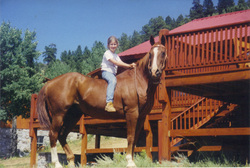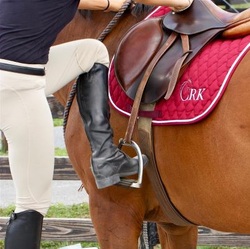Whether you are just learning to ride or honing your skills, having the right instructor is crucial to a great experience.
I have been publishing riding education online since 2012, and am passionate about helping riders, whether they have a great local instructor and want more out of their lessons, live in an area where quality instruction is hard to find, or are unsure about whether the local instruction they are currently receiving fits their needs.
Unless you have Olympic dreams or other big, competitive goals, the two most important factors in choosing a local riding instructor are:
1. Do you have FUN in your lessons? Are you comfortable around them, can you ask questions and feel at ease?
2. Do you feel SAFE? Does your instructor have your best interest in mind? Do they pair you with appropriate horses and ask you to work within your level of skill?
Whether you are looking for a local instructor, or are wondering if your current instructor is a good fit for you, then I would like to share 5 questions to help you get to know them better and see if their teaching style aligns with what you need as a student.
Hit play to watch the video below and learn 5 Questions to Ask Your Riding Instructor.
p.s. The more educated you become, the better you can be at recognizing a great instructor. Take my Free Better Riding in 7 Days Mini-Course to learn exercises for a better seat and improved balance.
Additional Resources:














37 Responses
These are great questions!
Thanks Callie!
Wow, this couldn’t come at a better time. I’m going to return to riding after over 30 years away, and I’m still in the process of assessing facilities and instructors. Great questions to help me get a better feel for the people I’m talking to!
Glad this video came at the right time to help you Pam 🙂 Good luck on your search!
-Julia, CRK Training Community Manager
Hi Callie, This is such an important subject – as a 60 yo, learning to ride, I’ve ridden with several instructors, and while they all have their strengths, what works best for me are the people who can explain not just what to do, but really break down Why and How to learn a skill. Feeling safe, is also so important, while having the confidence to move outside my comfort zone.
Feeling safe and comfortable is one of the most important aspects of selecting an instructor, thanks for mentioning that Kerry!
-Julia, CRK Training Community Manager
This is such an important thing for riding, IMO. I came back to riding after 20 years away, and have ridden with some big name instructors and some younger people. Almost uniformly, I was pretty unimpressed with the big name people. But some of the younger people just starting out left me with lessons that have improved my riding for years. In the last 30 years, I’ve pretty much given up on riding instructors entirely, as I’m not a big talent and sometimes need more time to grasp and integrate concepts, so it’s better if I work by myself at my own speed. I can only think of two instructors over that time who were really valuable for me. Also, often if you’re not on a big, expensive horse, a lot of instructors don’t give you the same lesson or spend the same amount of effort with you, which is itself pretty sad but very common in my experience. I spend a lot of time working with my horse and reading various instructors, and thus have perhaps more background than many students in various types of training. The kind of horses I choose to have are usually spunky, strong-minded, energetic, and hyperintelligent animals, and many riding instructors do not like those kinds of horses and have no idea how to approach them productively at all, causing more harm than good. I spent decades reading the old masters and some more recent trainers and then experimenting on my own with their techniques. And, sure, I made mistakes, but as long as you go slowly and considerately those mistakes can be easily remedied and each ‘mistake’ teaches you a lot. Also, my horse’s soundness and attitude are very important to me, and those two things seem to be less important to most riding instructors that I know, sadly. There were many lessons when the instructor just stood there saying ‘good’ when even I knew it wasn’t good. This undermines your authority tremendously with a serious student, but I know some students really like to ride with famous people just so they can say they rode with them. In the hunter world, it seems that being a nasty and abusive trainer is all the rage in some places, too, and that type of training does nothing for me. In the dressage world, the cost of your horse sometimes seems to be the overriding factor with some instructors. I remember taking a shared lesson with one of the biggies in the field, and all his attention was on the girl I shared the lesson with, who was on a big WB. That really ticked me off, as I paid the same for my half of the lesson as she did and she could barely keep her horse moving, let alone do anything else. That kind of stuff gives some instructors a VERY bad name and the same for the sport in general, unfortunately. I have also seen some relatively big name trainers take a horse in for training and either ruin the animal mentally or physically or provide literally NOTHING for the considerable financial outlay involved. Not to mention the times such trainers sold inappropriate and unsafe horses to amateur riders.
Hi Kathy, thanks for sharing your thoughts! It does help when your instructor enjoys working with not only you but your horse as well and can make unbiased recommendations if you are in fact over horsed 🙂
-Julia, CRK Training Community Manager
One thing that is difficult to ask questions about is the mental attitude of the instructor towards the student. Are they positive or negative, in their outlook towards you and their teaching style of you? Just because your friend loves the instructor, doesn’t mean she is the right teacher for you. In order to find a teacher who resonates with you, a trial lesson or two may help you decide. There is a lid for every pot.
Absolutely, an instructor choice is an individual’s choice – just because one instructor works for someone doesn’t mean they’ll work for everyone!
-Julia, CRK Training Community Manager
Love this!
Callie,
If a student asked you these questions, what would your answers be?
I’m curious, because I have so much respect for your classes and teachings.
Hi Connie, thanks for asking!
1. I believe that the most important part of riding is our connection to and relationship with the horse.
2. I became a riding instructor to share the joy of riding – and I most wanted to help new and novice riders as I felt they were often overlooked in some barns.
3. I love teaching the basic seat, helping someone who has always felt a bit insecure or “not quite right” in the saddle feel how effortless and easy it can be.
4. A big key to being a good student is to be in the moment, not analyzing everything, worrying about what’s next, or trying to figure it all out. Just feeling and enjoying what we are doing.
5. There was a teacher I had when I was around 13 years old that changed the way I experienced riding. Jane was a retired Grand Prix show jumping rider and was giving me lessons on my wild OTTB. In my other lessons it often felt like rider against horse and horse against rider (which is why I preferred to just go out and gallop around on my older horse, Scotch, instead of doing all this “practicing”). But with Jane, lessons were about working with the horse, listening to the horse, she made learning fun.
I had been riding for many years when I had a lesson with an insructor in New Zealond
Who was the first one to ask me questions about how and why. This was challenging as we do things automatically as trained and often do not think about it.
This was a unique experience.
I’ve had 3 lessons so far. I have thoroughly enjoyed every one thus far. I am 63 years old so no longer a spring chicken. My main concern was that the instructor may see my age and not me. I needn’t have worried. My instructor is great. On my first lesson I asked lots if questions around what I could expect, how long had she been riding and teaching and what where her expectations of me as a student. The questions plus the experience of the first lesson with her, helped me decide that she was someone I could work with. The horse I’m on is wonderful. Clearly an experienced school horse. Out of the five questions I will definitely ask what makes a good student. Thanks Callie. Frank. Liverpool UK.
Glad to hear you found an instructor that works well for you Frank!
-Julia, CRK Training Community Manager
Hi Callie!
Very good questions!
When I made a second start two years ago, my riding instructor asked me: what do you want to learn? And I said: I want to learn to sit in the saddle. And she said: Oaky, so this is about balance. And so that was what we worked on. I did not even need to ask!
That is great Ellen! Sounds like you have found a winner 🙂
-Julia, CRK Training Community Manager
Very important questions and outside of the “ normal, standard” questions.
Thank you. These are truly insightful questions. As a riding instructor, I am asking MYSELF these questions as well as bringing them to the attention of my students. And I agree that it is so important to be able to answer these. I always tell students – ask yourself, ask ME…why? If there is not a satisfactory answer there, something is missing.
Glad to have another instructor here Elaine! 🙂
-Julia, CRK Training Community Manager
I really admire how you so freely offer your time and your invaluable wealth of knowledge, for the sake of both horses and riders. There is no excuse for ignorance or poor horsemanship anymore, thanks to amazing people like yourself.
Glad you enjoy our videos Judy!
-Julia, CRK Training Community Manager
HI Callie,
I LOVE YOUR WEEKLY, TEACHING VIDEOS! My favorite question, which I plan to ask both of my trainers, is this one: Was there a teacher or moment she had that triggered a significant, positive shift in their own riding? Also, What makes a good riding student? I’ve been riding most of my life (started out in 4-H Saddle Club), have owned my own horses and done many kinds of riding. But until recently, I’ve had very little formal training. I HAVE SO MUCH TO LEARN! I’m now riding dressage and love the communication/connection with the horse. Thanks for all of your inspiration. Once this pandemic is behind us, I’d love to attend a weekend training session with you — if you ever offer things like that.
P.S. I also host the POWERING UP podcast. I’d love to have you as a guest, if you are ever interested.
REALLY listen to your gut, your inner voice after choosing an instructor. If it feels wrong working with someone, for the reasons and circumstances of why you’re riding and taking lessons, pay close attention to that red flag. Especially if that feeling happens more than once. Start looking immediately for a more appropriate instructor or perhaps a possible solution with the current instructor (esp if you truly think it’s an awareness and/or a communication problem—just be prepared to let go of that instructor). Above all, don’t needlessly hang in there, putting up with the current situation, thinking it’ll get better on its own. It won’t. Embrace the needed change and act on whatever solution you think is best—you won’t be wrong in the end and certainly won’t regret being happier!
Great advice Mariann, thanks for sharing!
-Julia, CRK Training Community Manager
Thank you once again Callie. So often, choice of instructor is made based on geography and finances.
Students need to know that not only must the instuctor match their learning style, he/she must also match with your philosophy and your goal set.
You are absolutely correct Anna!
-Julia, CRK Training Community Manager
My instructor answers these questions on the first lesson, even if not asked
That is great Rossana!
-Julia, CRK Training Community Manager
Love this set of questions! What a nice perspective!
Can’t hold my curiosity to ask you about your own view on these matters!
I’m not very fond of on line learning, specially when there’s another being involved in the process,but I really wish one day I’ll have the opportunity to go spend a week learning from you at your facility!
I second that this couldn’t have come at a better time as I’ve just had the most discouraging lesson I’ve ever taken and am thinking it’s time to throw in the towel. I started taking lessons as an adult 2 years ago because I want to be able to safely ride with my sister who owns horses. I’ve switched barns a few times to try to find a place that would be both safe and fun but the fun part is just missing. I realized that I’m paying for 30 minutes of hearing nonstop things I’m doing wrong. I feel like a complete failure and am wondering if since I didn’t learn as a kid, this sport is not going to work for me. I love the horses and am reasonably fit and mobile. Are there any instructors who know how to make learning to ride fun?
Hi Carrie, I’m really sorry to hear about your experiences with negativity in your lessons. That can make it difficult to want to go back to a certain barn or instructor! Are there a couple other barns in your area that you could try a lesson to see if somewhere else is a better fit for you?
-Julia, CRK Training Community Manager
Thanks Julia. It’s really nice that you think I might find someone who can be a fun and satisfying teacher. I will keep looking and in the meanwhile try to communicate effectively to the teacher I already have. I feel more hopeful now.
May I make a suggestion for your next lesson when you follow-up with your instructor? Request to receive ONLY the good stuff you do for your 30 minutes of riding (and insist on it, even if your instructor resists this). NO negative criticisms whatsoever, focus on only the positive stuff, even if small, and practice only that for the entire lesson from start to finish. You’ve earned it for sure and it will help “re-focus” your instructor at the same time. And keeping smile big the whole time–and watch the positive magic happen with the three of you! 🙂
I love this idea. Thanks!
I love this Mariann!
My question is related – how to choose a horse rescue group to volunteer for?
I adopted a horse from this group and have volunteered at least once a week for the past 4 years. My concern was huge when, 3 weeks ago I walked over to the quarantine pasture to say hi to a new horse. My first thought at seeing the horse was that I needed to rescue her from the rescue. Why – the drinking water was peutrid – disgusting. There were even things that looked like worms swimming in it. And flies all over her face. She had a body score between 1 and 2 and dsld on one hind leg. She needs everything good. The barn manager had been told not to go near her as she might carry a highly contaigous disease. I’ve applied to adopt her. The next day the water was clean. I think they need a better system for horses that may carry a contaigous disease. There was one other time when I felt the care was inadequate. They do a lot of good and have way more horse hours/experience than i do. But, I know how to provide clean water, feed and shelter. I want to help horses, but don’t have a really comfortable feeling about this rescue. I think the barn manager is great and I work with her so that is good. But, not at all comfortable with the care of 2 of the horses I saw.
Any suggestions about why to stay or go to another rescue? If I stay I’m willing to offer to be the person who would care for a horse who may be highly contaigous. I also believe that horses have emotional as well as physical needs. And in these 2 cases, neither of those needs were being met.
Hi Andy, that sounds like a very disappointing situation. Not having clean drinking water is definitely something that I would take issue with, did you bring up the situation with the new horse not having clean water? Is there a way you could perhaps recommend a system for taking care of the quarantined horses and offer to care for them? You could even phrase it to the manager in a way that you willing to help out and that might even be a relief for her to have good help 🙂
You could also look into other rescues in your area to see if the level of care of better elsewhere that you may be more comfortable!
-Julia, CRK Training Community Manager